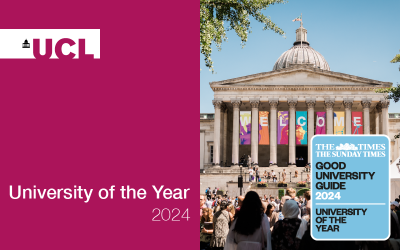Contents
Overview of UCL Institute of Finance & Technology
Introduction:
The UCL Institute of Finance & Technology (IFT) is a pioneering academic and research institution dedicated to advancing knowledge in digital finance, sustainable investment, and emerging technologies. Established in 2019, IFT integrates interdisciplinary approaches to address the evolving challenges and opportunities in modern finance. Through cutting-edge research and innovative teaching programs, it serves as a hub of excellence for students, researchers, and industry professionals.
Mission and Vision:
IFT’s mission is to foster innovation and sustainability in finance by leveraging technology and data-driven approaches. Its vision is to become a global leader in digital finance research and education, equipping students with the tools and knowledge to shape the future of the financial industry.
Key Research Areas:
- Digital Finance and FinTech:
- Investigating the impact of technologies such as blockchain, cryptocurrencies, artificial intelligence (AI), and machine learning on financial systems.
- Addressing the challenges of financial digitalization and developing scalable solutions.
- Sustainability and Impact Investing:
- Promoting sustainable finance strategies and impact-driven investments.
- Creating frameworks to assess environmental, social, and governance (ESG) factors in investment decisions.
- Urban and Infrastructure Development:
- Analyzing investment opportunities in urban infrastructure and adaptive reuse strategies.
- Designing sustainable financing models for infrastructure renewal.
Highlighted Research Projects:
- AI-Based SME Credit Risk Assessment:
Developing artificial intelligence tools to assess the financial impact of the COVID-19 pandemic on SMEs, enabling data-driven risk management strategies. - Blockchain for Waste Recycling Management:
Designing a blockchain-based incentive system to promote recycling and sustainability practices.
Academic Programs:
IFT offers postgraduate programs that combine theoretical foundations with practical industry applications. Key topics include machine learning, IoT, AI, and sustainable finance, preparing students to lead in digital finance and alternative investment sectors.
Industry Collaboration:
The institute collaborates with major public and private sector organizations, including HM Treasury, the World Bank, IMF, and BlackRock. These partnerships ensure that IFT’s research and programs remain relevant and impactful.
UCL Institute of Finance & Technology Programs: Bridging Finance, Technology, and Sustainability
Here’s a more detailed and enriched summary of the programs offered by UCL’s Institute of Finance & Technology (IFT), which emphasize the fusion of finance, technology, and sustainability:
1. Banking and Digital Finance MSc
Program Overview:
This program is designed to provide students with an in-depth understanding of the critical intersection between finance and emerging technologies, focusing on how innovations such as fintech are transforming traditional banking and financial systems. The curriculum is tailored to address the growing global demand for professionals equipped with expertise in digital finance and technology-driven banking services.
Key Topics Covered:
- Digital Transformation in Banking: Explores how financial institutions are embracing technological advancements to enhance customer experiences, streamline operations, and drive growth.
- Fintech Innovations: Provides knowledge on key fintech trends such as blockchain, cryptocurrencies, digital wallets, robo-advisors, and peer-to-peer lending.
- Regulatory Challenges: Delves into the regulatory and compliance issues faced by financial institutions and fintech firms, particularly in relation to data privacy, cybersecurity, and anti-money laundering.
- Global Finance Trends: A comprehensive exploration of how digital finance is reshaping global financial systems, focusing on emerging markets and the international regulatory environment.
Learning Outcomes:
Graduates are equipped to pursue careers in areas such as digital banking, fintech startups, and technology-focused financial institutions. They will also have a strong foundation in addressing financial challenges through innovative technology solutions.
2. Venture Capital & Private Equity with Financial Technology MSc
Program Overview:
This program focuses on the role of fintech in venture capital (VC) and private equity (PE) sectors, providing insights into the dynamics of investing in fintech startups. It explores governance structures, value creation strategies, and the competitive forces shaping the growth and success of emerging technology-based financial enterprises.
Key Topics Covered:
- Fintech Business Models: Students learn about different fintech business models, from peer-to-peer lending platforms to blockchain-based financial services, and their implications for investment strategies.
- Governance and Risk Management: Examines the governance structures within VC and PE firms, and the management of risks in fintech investments, including regulatory risk, technological risk, and market volatility.
- Performance Metrics: Focuses on evaluating the performance of fintech startups, covering financial metrics, market positioning, and long-term sustainability.
- Global Investment Trends: Analyzes global trends in venture capital and private equity, with a special emphasis on the growing role of fintech in investment portfolios.
Learning Outcomes:
Graduates will have the expertise to work in VC and PE firms, advising on and managing investments in high-growth fintech companies. They will understand the nuances of fintech ecosystems and how to effectively leverage technology to create value and drive success.
3. Responsible Finance and Alternative Assets MSc
Program Overview:
This program equips students with the knowledge and tools needed to understand sustainable finance and alternative assets. It focuses on how finance can be leveraged for social good, integrating concepts such as Environmental, Social, and Governance (ESG) factors into investment strategies. Students will also learn how to navigate the emerging field of alternative assets, such as green bonds, impact investing, and renewable energy funds.
Key Topics Covered:
- Sustainable Finance Practices: Explores the principles of sustainable investing, including ethical investing, climate finance, and the role of finance in addressing global challenges like poverty, inequality, and environmental degradation.
- Alternative Assets: Students will study a range of alternative assets, including hedge funds, private equity, real estate, commodities, and renewable energy investments.
- ESG Integration: Focuses on how to incorporate ESG considerations into investment decision-making, and the growing demand for sustainable financial products from institutional investors.
- Impact Investing: An in-depth exploration of impact investing, which seeks to generate social and environmental benefits alongside financial returns.
Learning Outcomes:
Graduates will be well-prepared to work in asset management, sustainable investment funds, and organizations focused on responsible finance. They will have the ability to create and manage portfolios that balance financial returns with social and environmental impact.
4. Finance and Technology MPhil/PhD
Program Overview:
This research-focused program is designed to develop the next generation of thought leaders and innovators who will drive the transformation of financial systems through technology. The program offers the opportunity to conduct cutting-edge research in areas such as blockchain, AI in finance, digital currencies, and sustainable financial models.
Key Topics Covered:
- Financial Technologies (Fintech) Research: Delves into advanced topics in financial technology, including blockchain, cryptocurrencies, digital banking systems, and decentralized finance (DeFi).
- AI and Machine Learning in Finance: Explores the use of artificial intelligence and machine learning algorithms in optimizing trading, risk management, and financial forecasting.
- Impact of Technology on Financial Inclusion: Investigates how digital finance can improve financial access and inclusion, particularly in underserved populations and emerging markets.
- Policy and Regulation in Fintech: Analyzes the regulatory challenges and policy frameworks needed to foster innovation in fintech while protecting consumers and ensuring market stability.
Learning Outcomes:
PhD graduates from this program will be at the forefront of research in financial technology, capable of developing innovative solutions to complex financial problems. They will be well-positioned to take on leadership roles in academia, think tanks, policy institutions, or research divisions of major financial institutions and fintech companies.
Integration of Modern Technologies:
All of these programs incorporate cutting-edge technologies, such as machine learning, IoT, AI, and blockchain, providing students with a robust understanding of how these technologies are reshaping the financial industry. The curriculum emphasizes practical skills, research-driven insights, and industry exposure to ensure students are ready for leadership roles in the rapidly evolving financial landscape.
The programs at IFT aim to produce professionals who can contribute to sustainable financial practices, digital transformation, and financial inclusion, while also fostering innovative thinking that will drive the next generation of financial technologies.
Overview of the UCL Institute of Finance & Technology (IFT) and Key Staff
Here is a summarized overview of the UCL Institute of Finance & Technology (IFT) and its key team members:
Directors:
- Professor Francesca Medda: IFT Director, Professor of Applied Economics and Finance at UCL. She leads research on innovative finance, sustainable finance, and impact investments. Medda has coordinated digital strategy in the Italian Financial Conduct and Supervisory Authority and holds multiple research grants.
Academic Staff:
- Dr. Carlo Campajola: Lecturer in AI and Financial Analytics. His research includes AI in finance, blockchain, decentralized finance, and financial networks.
- Dr. Maurizio Fiaschetti: Lecturer in Banking and Finance. His research focuses on venture capital, private equity, and applied econometrics, with experience working with various financial institutions.
- Dr. Hui Gong: Lecturer and Programme Director of MSc Banking and Digital Finance. His research includes fintech, blockchain technologies, and AI applications in finance. Gong has founded the China UK Blockchain Association.
- Maxime Nicolas: Associate Lecturer. His research covers financial econometrics, risk management, and sustainable finance, with a focus on financial networks and machine learning.
- Dr. Ramin Okhrati: Lecturer in Digital Finance, head of AIRiskLab. He specializes in AI in finance, financial mathematics, and risk management.
- Akash Sharma: Associate Lecturer in Finance and Technology.
- Dr. Yang Song: Deputy Director and Head of Studies at IFT. He provides academic support and mentorship to students and researches financial modelling and infrastructure investment.
- Li Zhang: Associate Lecturer. Her research includes machine learning, graph neural networks, and financial network analysis, with applications in asset price prediction and market volatility.
UCL Institute of Finance & Technology: Industrial Professors and Their Expertise
The UCL Institute of Finance & Technology (IFT) is home to a diverse team of industrial professors who bring extensive real-world experience to the programs. Below is a summary of some of the key members:
Industrial Professors in Banking and Digital Finance:
- Brian Healy: Over 25 years of experience in financial markets, including roles as a trader, quantitative analyst, and consultant for hedge funds, structured finance, and asset-backed finance.
- Email: b.healy@ucl.ac.uk
- Budha Bhattacharya: Head of Systematic Research at Lombard Odier Asset Management, with expertise in machine learning and AI for trading and investment strategies, and a background in ESG and sustainability.
- Luca Cocconcelli: Data Analytics Manager at the London Clearing House with experience in risk modelling and analytics.
- Email: l.cocconcelli@ucl.ac.uk
- Piero Mazzarisi: Expert in financial mathematics with a focus on time series of networks and machine learning applications.
- Email: piero.mazzarisi@sns.it
Industrial Professors in Venture Capital and Private Equity:
- Matteo Benedetto: European Head of Fixed Income Capital Markets Syndicate for Financial Issuers at Morgan Stanley, with expertise in debt financing and securitization.
- Cagatay Bircan: Lead Research Economist at the European Bank for Reconstruction and Development, specializing in banking, entrepreneurial finance, and value creation in private equity.
- Email: cagatay.bircan.18@ucl.ac.uk
- Drago Indjic: Managing Director of Oxquant with expertise in machine learning and financial technology.
- Email: d.indjic@ucl.ac.uk
- Khalid Naji: Expert in start-ups and innovation, with experience in Sharia-compliant investing and sustainability projects.
- Email: k.naji@ucl.ac.uk
- Max Vermorken: CEO of SigmaRoc plc, with a background in private equity, venture capital, and financial economics.
- Email: maxvermorken@gmail.com
Industrial Professors in Responsible Finance and Alternative Assets:
- Amin Amal-Lee: Focuses on responsible finance.
- Email: amal-lee.amin@ucl.ac.uk
- Dr Hakan Lucius: Chief Sustainability Officer at the European Investment Bank (EIB), specializing in sustainable finance.
- Email: h.lucius@ucl.ac.uk
- Rebecca Macdonald: Head of Investment Management at Big Society Capital, specializing in impact investing and social enterprise.
- Dr Thomas Schröder: Managerial Adviser at EIB with expertise in finance, risk management, and bond markets.
- Email: t.schroeder@ucl.ac.uk
- Ronald van Loon: Managing Director at BlackRock, specializing in fixed income and ESG objectives.
- Email: ronald.vanloon@blackrock.com
Industrial Professors in Strategy and Short Courses:
- Peyman Mestchian: Head of Corporate Development at Quantexa, specializing in FinTech, AI, and venture capital.
- Email: p.mestchian@ucl.ac.uk
- Domenico Scopelliti: Sports lawyer with expertise in football transfers and legal consulting.
- Giulia Rosato: CFO at Endelea, focusing on ethical fashion and social impact.
- Email: g.rosato@ucl.ac.uk
- Philippe Dufournier: Expert in derivatives and capital markets with over 30 years of experience in leadership positions.




